17 Medical Technologist Resume Examples
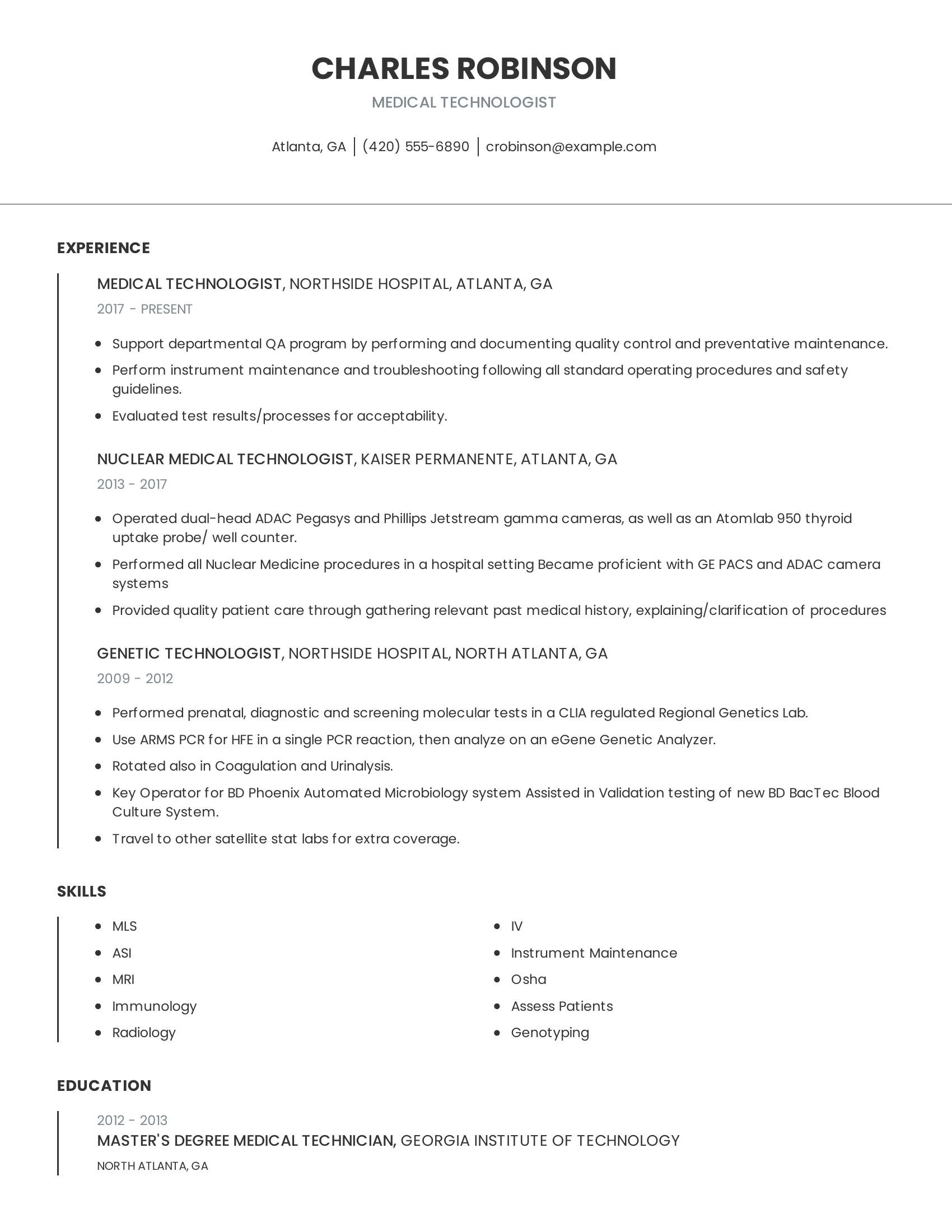



Medical technologist resumes should include clear and concise information about relevant work experience, skills, and education. A good resume highlights specific job duties and accomplishments, demonstrating expertise in laboratory procedures, equipment handling, and patient care. It should also list technical skills relevant to the field, such as knowledge of various diagnostic tests, instrument maintenance, and safety protocols.
This resume includes detailed job experiences that show a progression of responsibilities and expertise in different areas of medical technology. It lists practical skills like instrument maintenance, quality control, and specific procedures performed in various roles. The educational background is clearly stated, reinforcing the candidate's qualifications. This structured approach effectively communicates the candidate's capabilities in the medical technology field.

Medical technologist, generalist resumes should highlight specific technical skills, relevant work experience, and education. Key components include proficiency in laboratory procedures, experience with automated systems, and capabilities in various lab departments like chemistry, hematology, and microbiology. Clear communication of critical results and collaboration with healthcare professionals are also important.
This resume effectively covers those specifics by listing detailed job roles and responsibilities. It mentions experience with automated microbiology systems and various lab tests. The resume includes education background relevant to the field and details specific tasks performed in different job roles. The inclusion of skills related to blood samples, specimen collection, and test results demonstrates a well-rounded skill set.
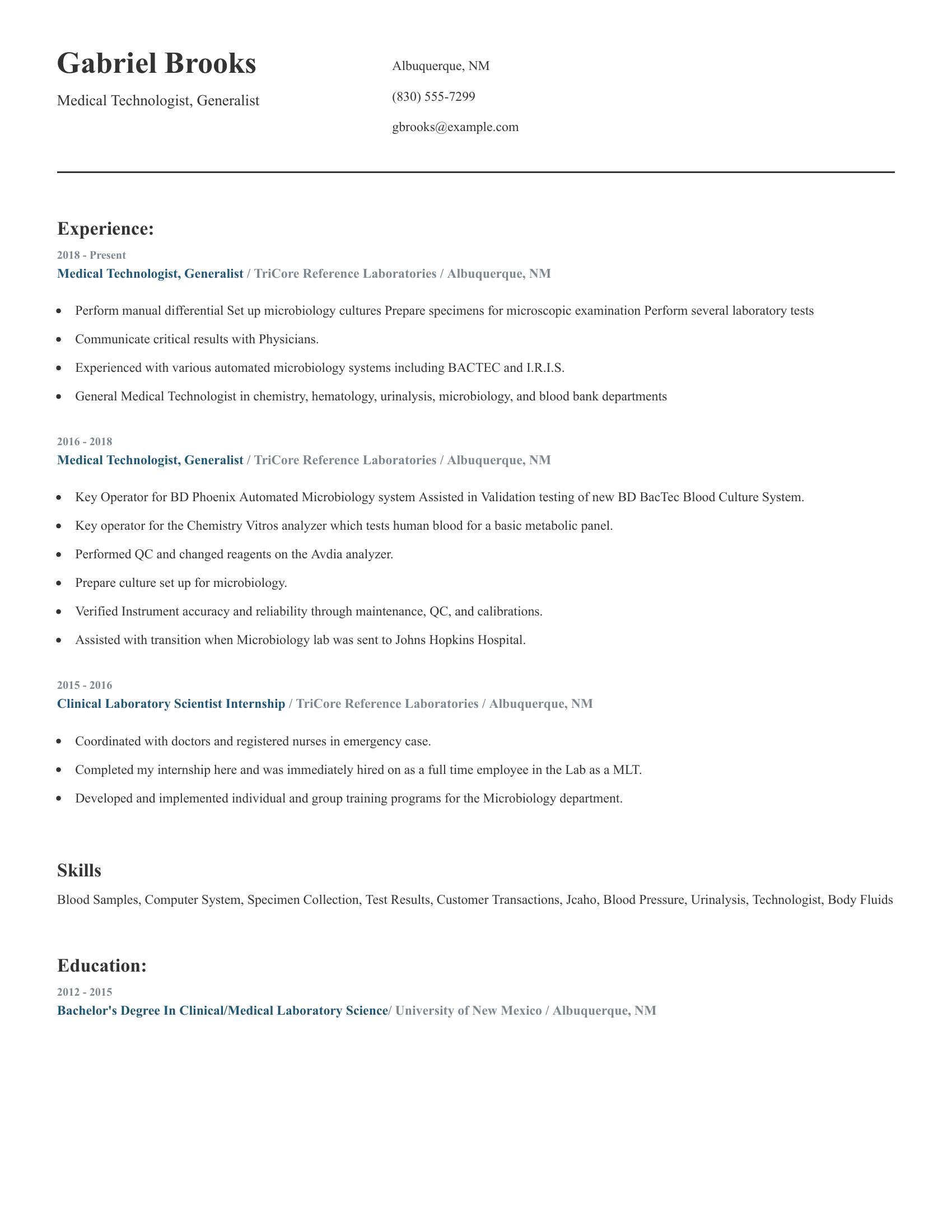
Senior medical technologist resumes should display extensive laboratory experience, proficiency with a variety of lab equipment, and a thorough understanding of regulatory compliance. It should also include details on specific tasks such as performing lab tests, maintaining equipment, and handling documentation. Experience in leading operations and ensuring safety protocols are followed is important. Highlighting skills in microbiology, specimen collection, and troubleshooting is also beneficial.
This resume includes diverse experience in different roles, showcasing a broad skill set. It lists specific tasks performed at various jobs, such as completing CLIA reports, working in the stat lab and blood bank, and performing EKGs and specimen collection. It also mentions handling regulatory compliance and leading lab operations. The skills section effectively highlights relevant abilities like raw materials management and microbiology knowledge.
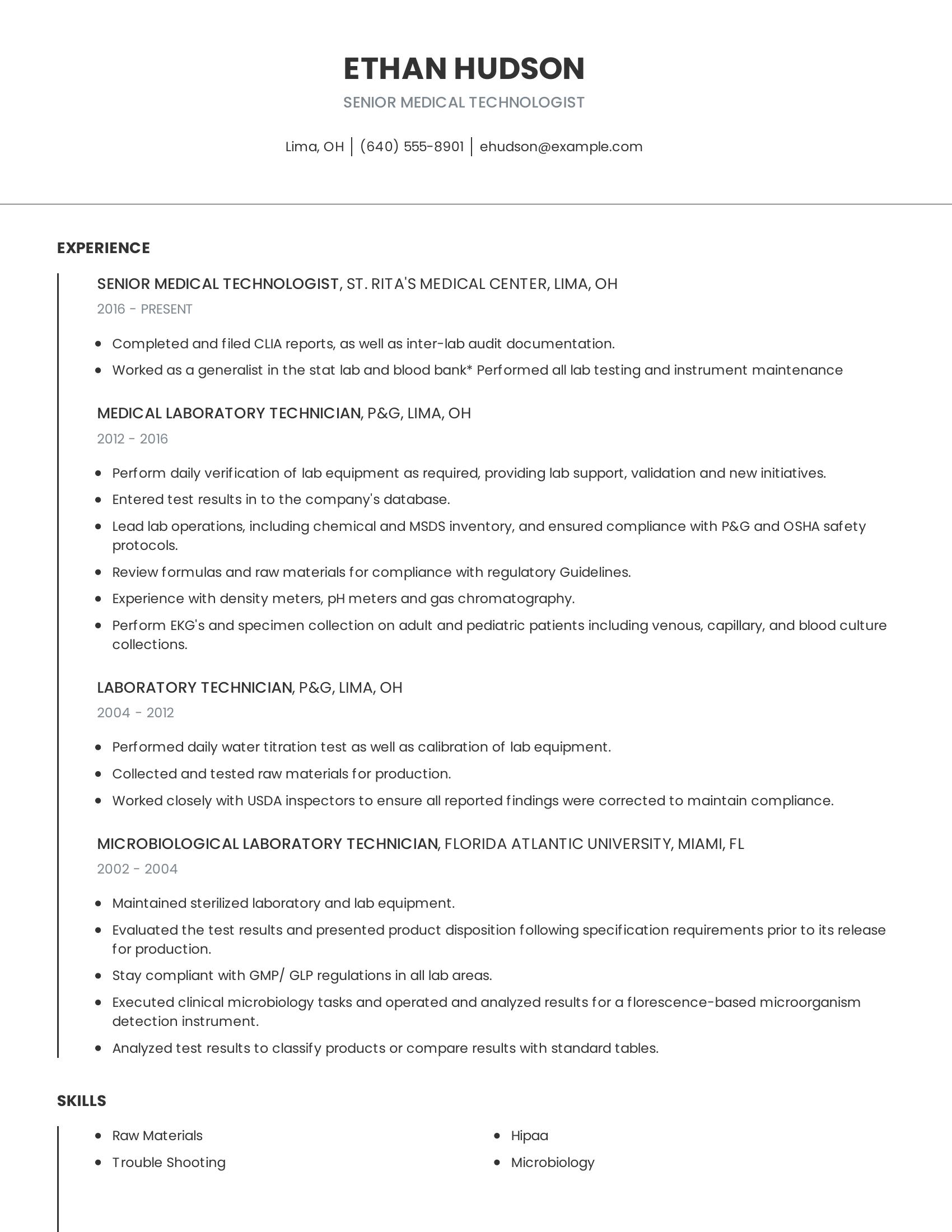
Medical laboratory scientist resumes should highlight relevant experience, skills, and education. They should include job titles, places of employment, and dates worked to show a timeline of professional growth. A good resume lists specific duties and accomplishments in past roles. It also includes technical skills relevant to the job, such as proficiency in various laboratory tests and procedures. Education details should highlight degrees earned and fields of study.
This resume includes those specifics by listing detailed job titles and responsibilities at different institutions. It shows a progression from an internship to senior roles, indicating career advancement. The resume also lists technical skills like antibody identification and chemical analysis, which are relevant to the field. Education information includes the degree earned and the major, showing the candidate's academic background in clinical or medical laboratory science.
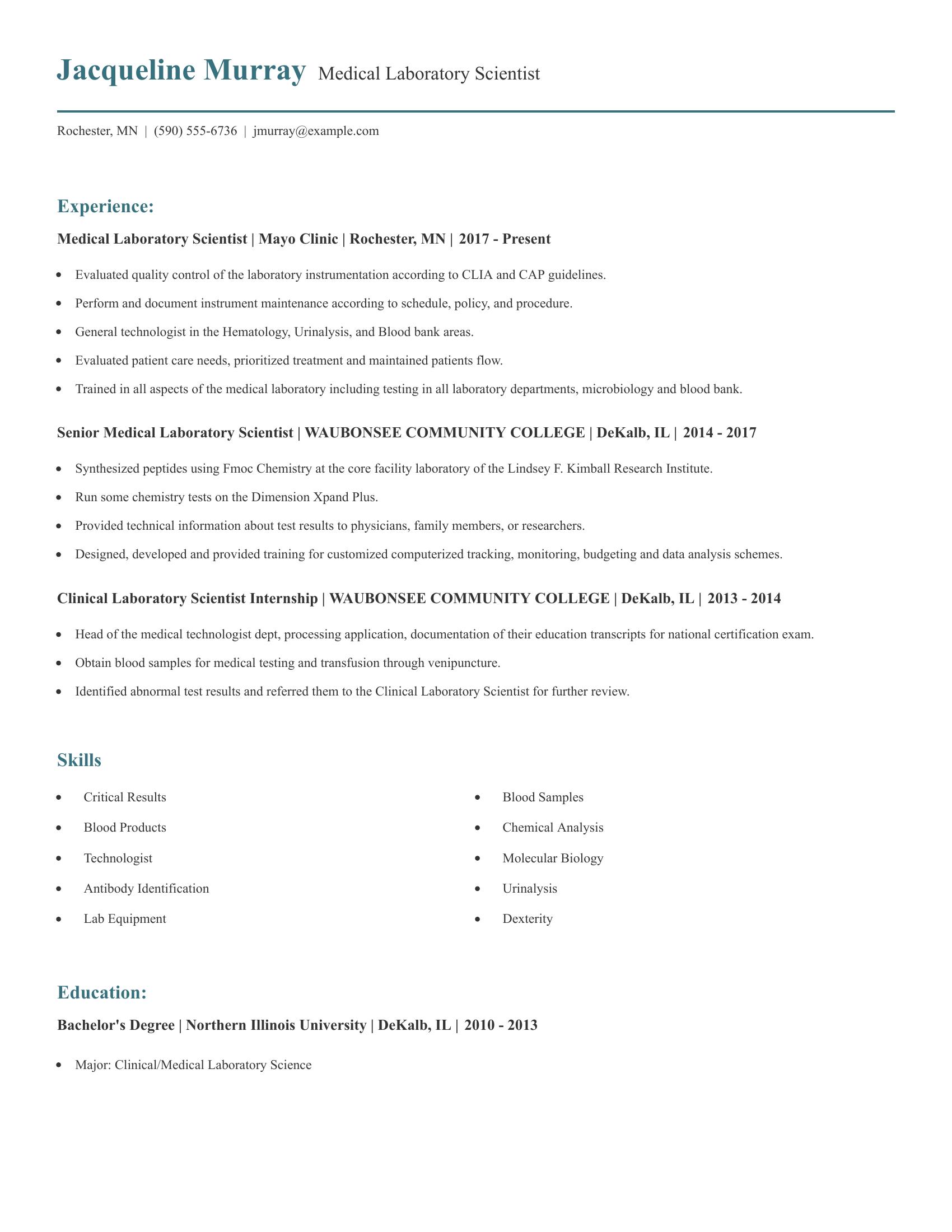
Medical laboratory technologist internship resumes should include clear and relevant information about education, skills, and work experience. Important elements are contact information, a list of technical skills related to laboratory work, and detailed descriptions of previous internships or job roles. The resume should highlight hands-on experience with laboratory procedures, equipment calibration, data analysis, and problem-solving capabilities within a lab setting. Education credentials should also be clearly listed to demonstrate academic preparation for the role.
This resume effectively includes these specifics by providing concise sections on contact information, technical skills, and employment history. It lists relevant skills like Python, R, and microbiology. The work experience section details specific tasks performed during internships at USDA and Microsoft, such as specimen collection and handling QC issues. The education section accurately shows the candidate's academic background with degrees in medical technology from reputable universities.
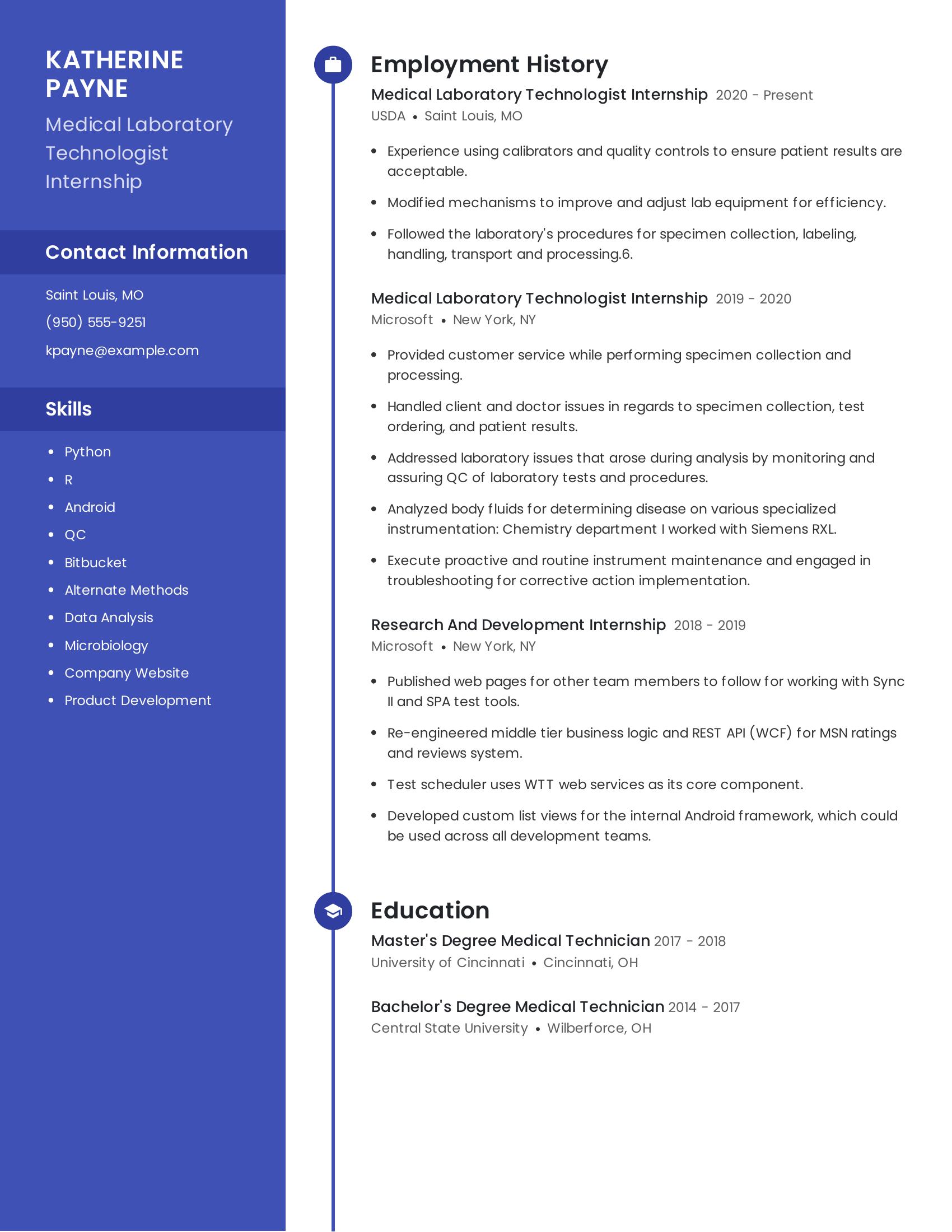
Medical technologist lead resumes should highlight leadership experience, technical skills, and familiarity with laboratory equipment and procedures. Key components include detailed job experience, specific skills related to lab work, and adherence to industry regulations like OSHA and HIPAA. It is also important to show involvement in process improvements and cross-departmental communication.
This resume includes relevant job titles and dates, providing a clear career trajectory in laboratory settings. It lists specific tasks such as performing gram stains and operating lab equipment. The resume also mentions regulatory compliance and participation in process improvements, showcasing both technical expertise and leadership. Moreover, it highlights communication with other departments, reflecting teamwork abilities.
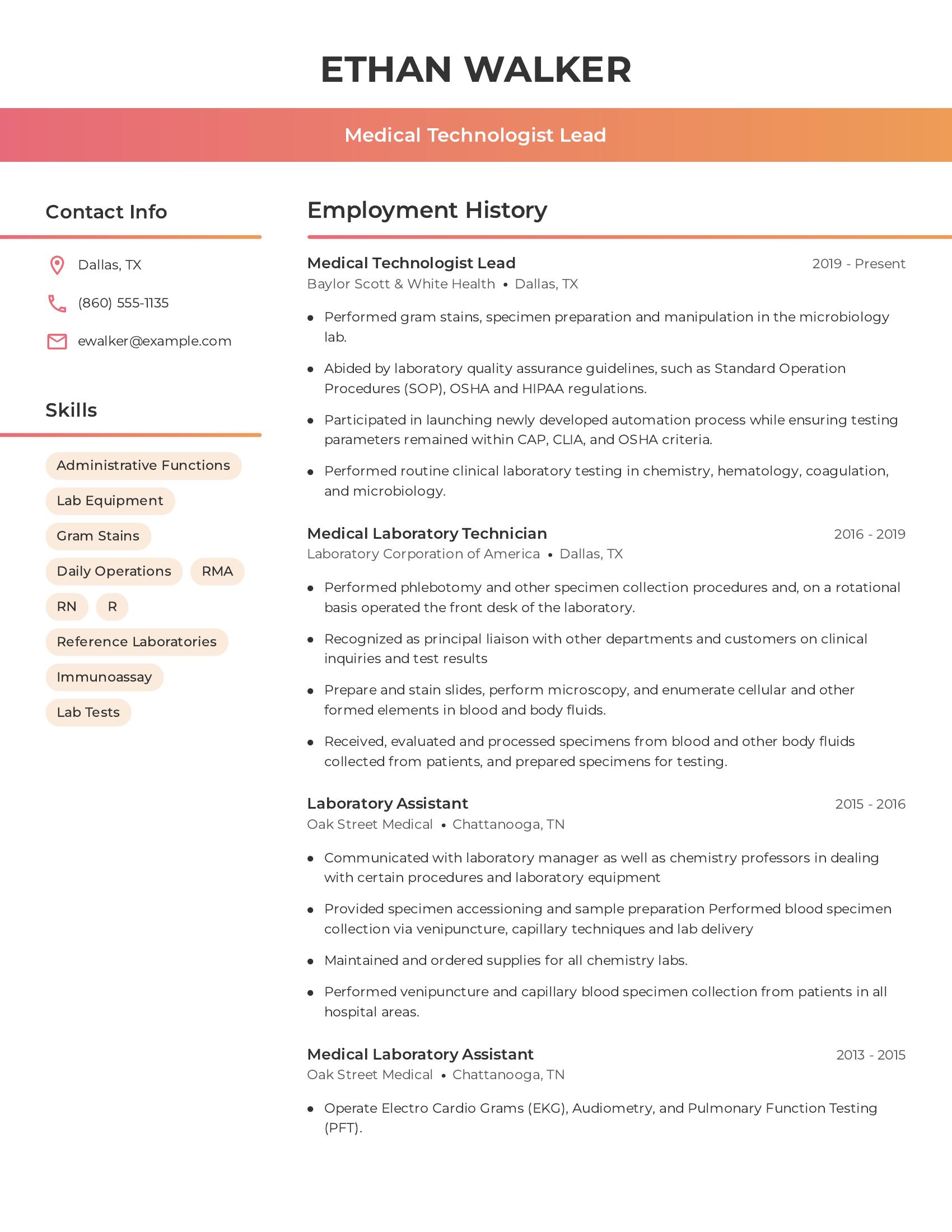
Medical laboratory technician resumes should highlight relevant work experience, specific technical skills, and educational background. Experience sections should detail hands-on tasks performed, such as running tests and using laboratory information management systems (LIMS). Skills should directly relate to laboratory tasks, such as patient care and data integrity. Education should list degrees and certifications that show the candidate's qualifications in medical laboratory science.
This resume includes clear work experience with specific duties at each job, such as performing chemical analysis and using LIMS. It lists relevant skills like proper patient identification and flow cytometry. The education section specifies a degree in clinical/medical laboratory science, showing the applicant's foundation in the field. These elements create a comprehensive picture of the candidate's qualifications for a medical laboratory technician role.
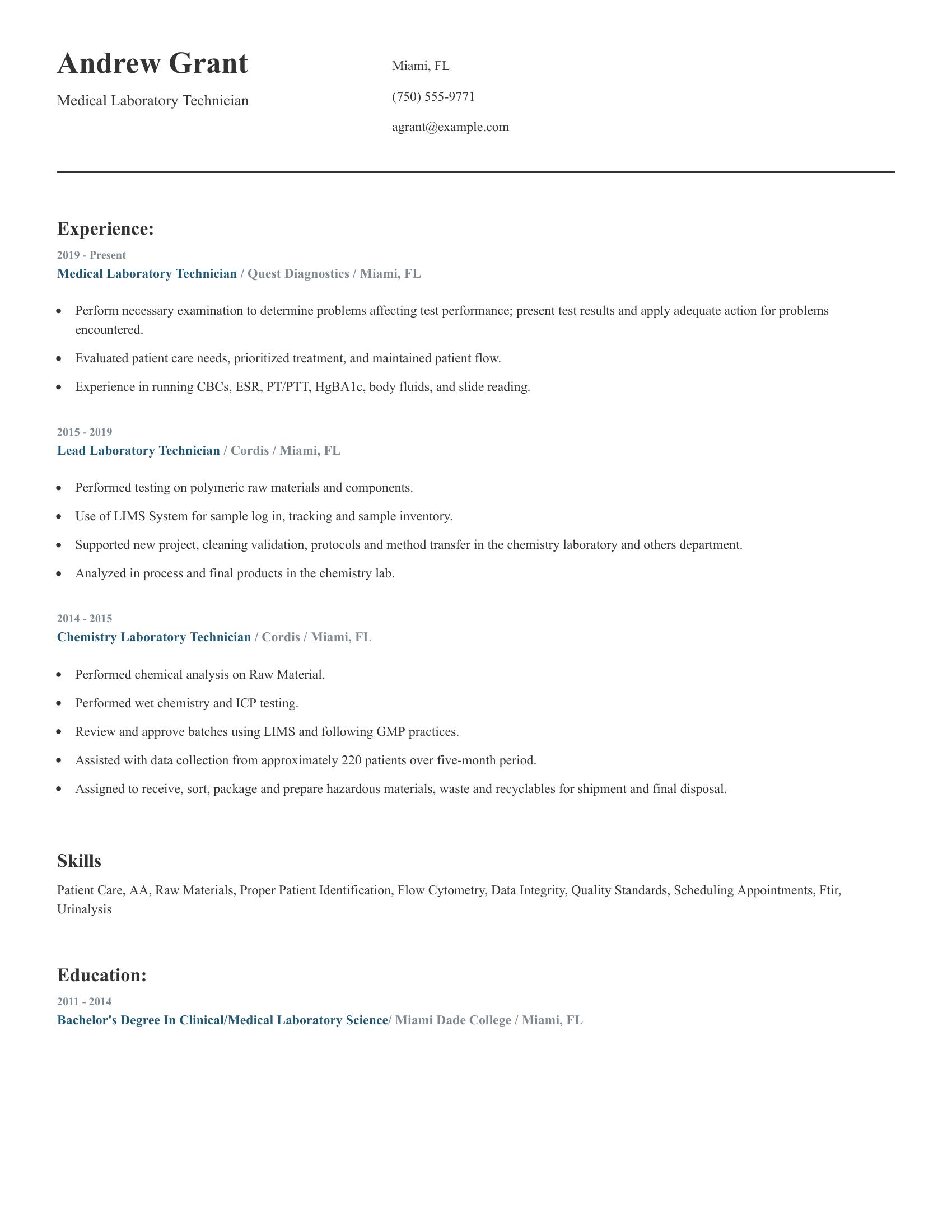
Medical laboratory specialist resumes should highlight the candidate's skills, work experience, and education in a clear and concise manner. Important sections include contact information, a list of relevant skills, detailed employment history with specific duties, and educational background. It is crucial to include technical abilities, laboratory procedures performed, and any specialized training or certifications.
This resume includes all necessary sections such as contact details, a comprehensive list of relevant skills like body fluids and microbiology, and a detailed employment history with specific tasks performed at each job. It also lists the candidate's education in medical laboratory science. The resume highlights the specialist’s experience with various lab procedures and technologies, making it clear they have extensive hands-on experience.
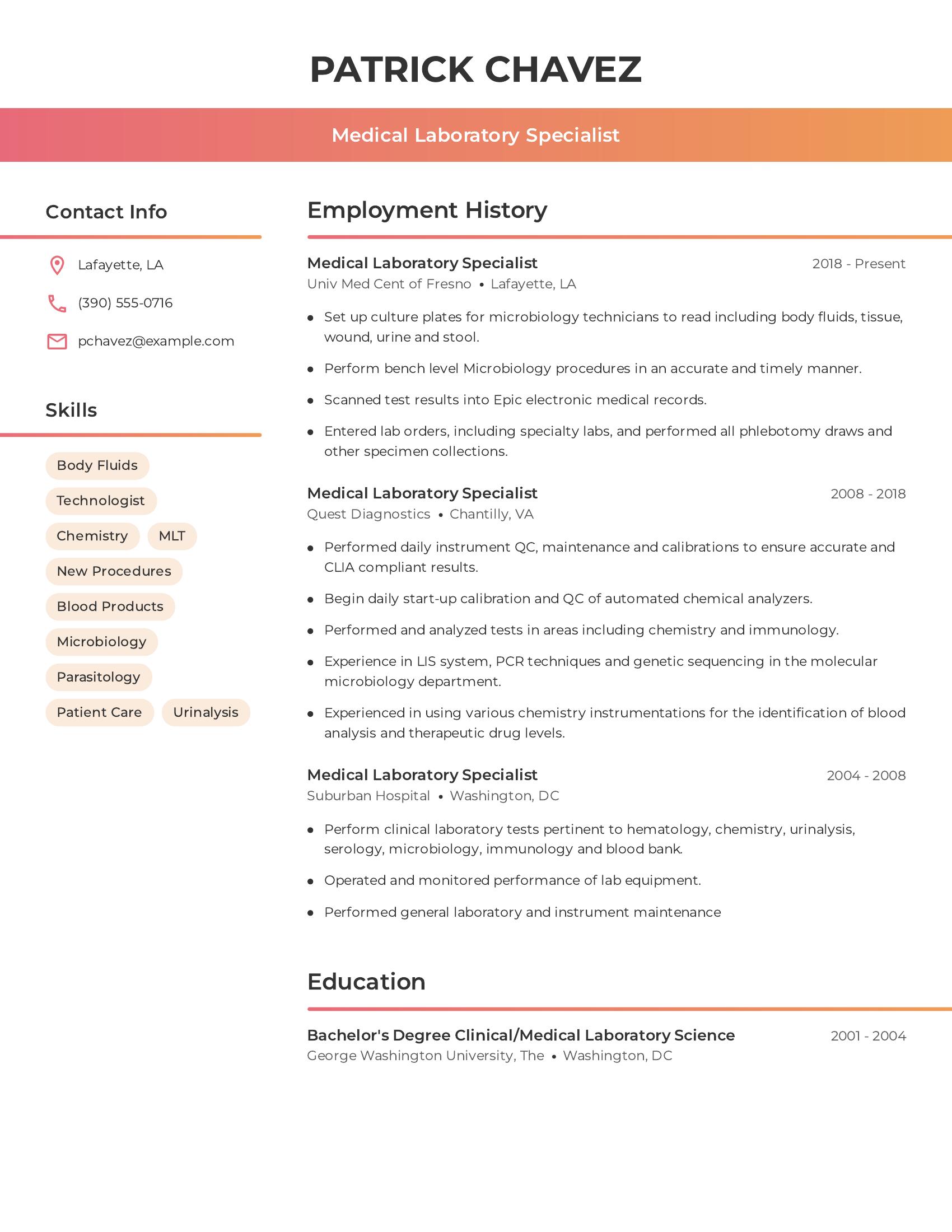
Medical technologist-microbiology resumes should highlight relevant skills, experience, and specific job duties. Important elements include contact information, a summary of skills, and detailed employment history. Skills should focus on laboratory techniques, specimen collection, patient care, and use of lab equipment. Employment history must detail responsibilities and achievements in past roles, showcasing the candidate's ability to handle clinical tasks and troubleshoot technical issues.
This resume effectively includes those specifics. The contact information is clear. Skills listed include lab equipment proficiency and specimen collection. The employment history details roles at three different organizations, with specific duties like performing clinical lab procedures, training in phlebotomy, and troubleshooting complex instruments. The resume also mentions relevant tasks like microbial analyzes and environmental monitoring.
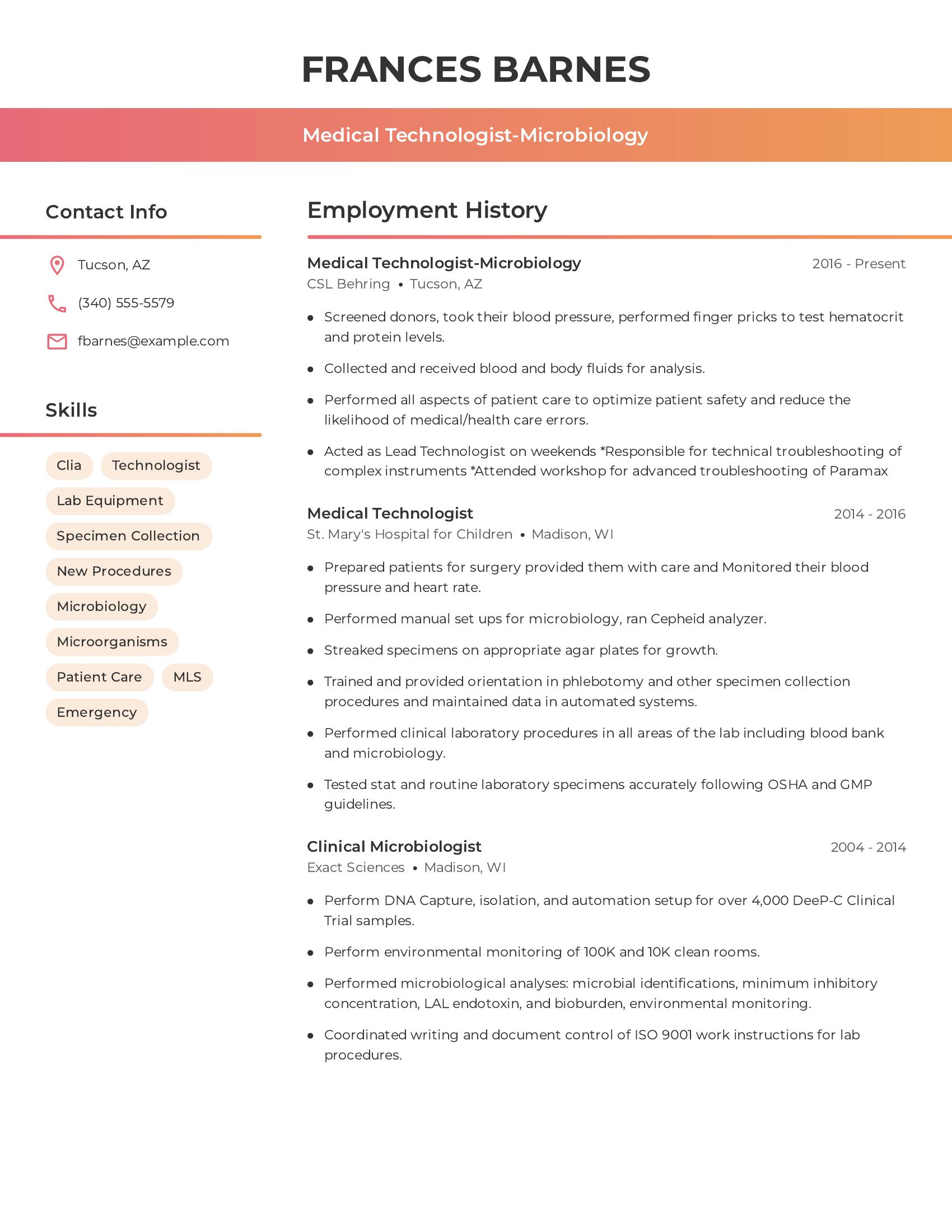
Clinical laboratory technician resumes should highlight relevant work experience, technical skills, and education. Important details include past job responsibilities, specific laboratory techniques, and any specialized equipment used. Mentioning previous employers and job durations helps show stability and experience in the field.
This resume includes these specifics well. It lists employment history with clear job titles and dates, detailing tasks like data analysis, assay initiation, and specimen preparation. Skills such as regulatory knowledge and instrument maintenance are noted. The education section shows a relevant degree, providing a comprehensive view of qualifications.
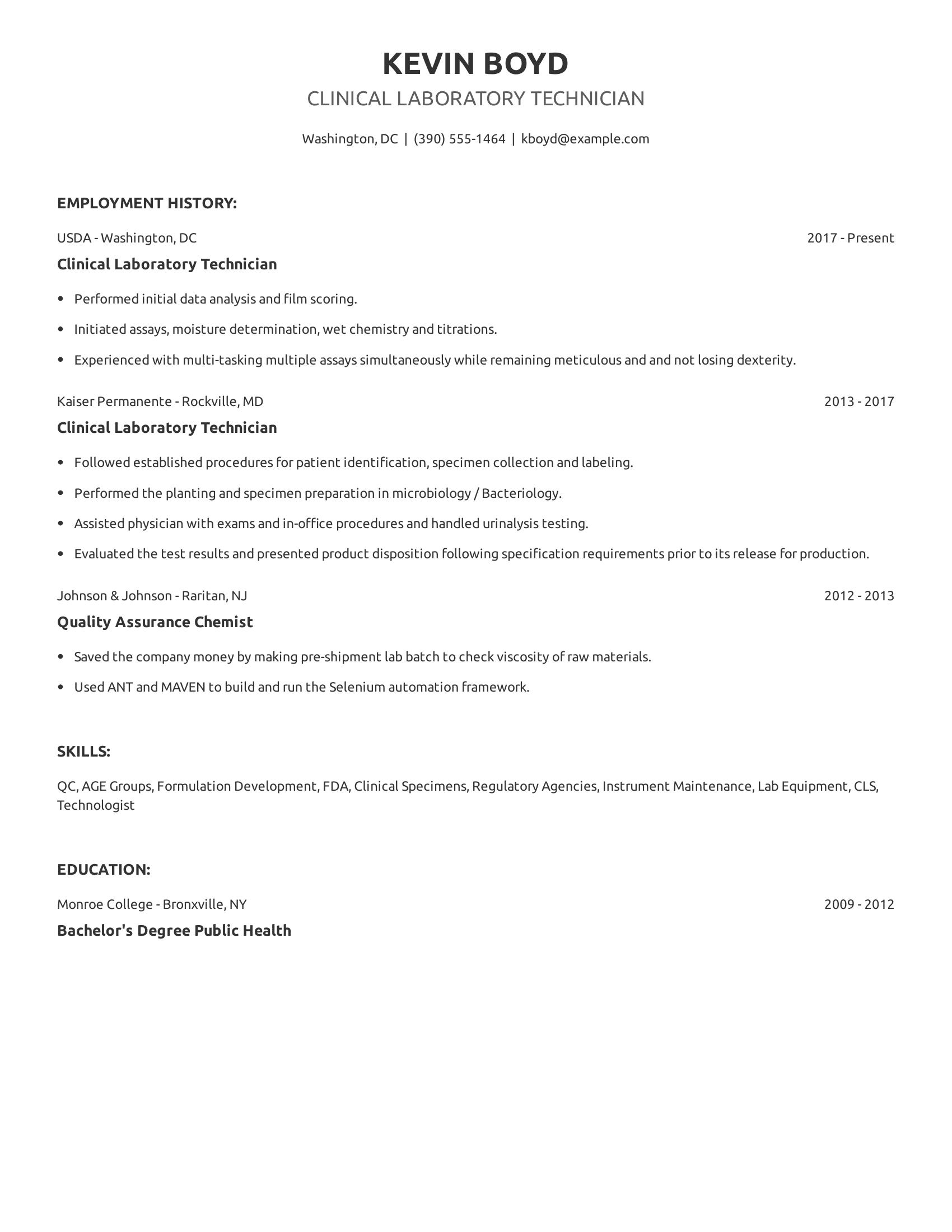
Clinical laboratory scientist resumes should detail technical skills, employment history, and educational background. Important elements include knowledge in areas like hematology, microbiology, and chemistry. Experience with lab procedures, test result accuracy, and quality control is crucial. Clear contact information and concise skill listings are also vital.
This resume effectively includes relevant skills such as patient results, blood samples, and bacteriology. It showcases a solid work history from 2012 to the present, highlighting various roles in different labs. The education section provides necessary academic credentials. Each job entry lists specific duties performed, demonstrating a wide range of lab capabilities.
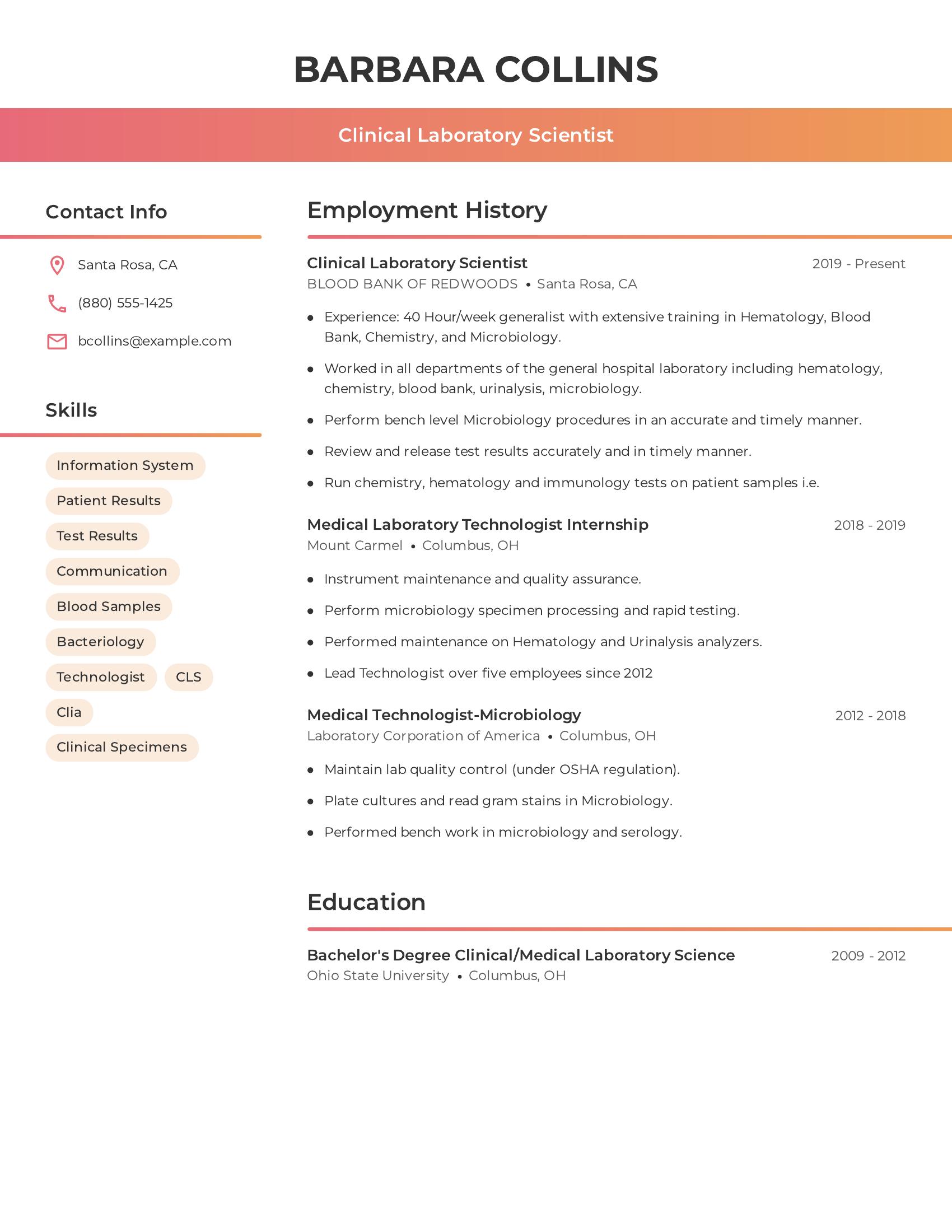
Medical laboratory assistant resumes should include relevant work experience, skills, and education. The employment history should detail specific duties like drawing blood, performing EKGs, and recording vital signs. Skills should focus on patient care, medical procedures, and administrative tasks. Education must list relevant courses or degrees.
This resume includes specific job duties such as drawing blood and performing EKGs. It lists skills like patient care and handling vital signs. The employment history gives detailed descriptions of previous roles in medical settings. Education is mentioned with relevant coursework in medical assisting services.
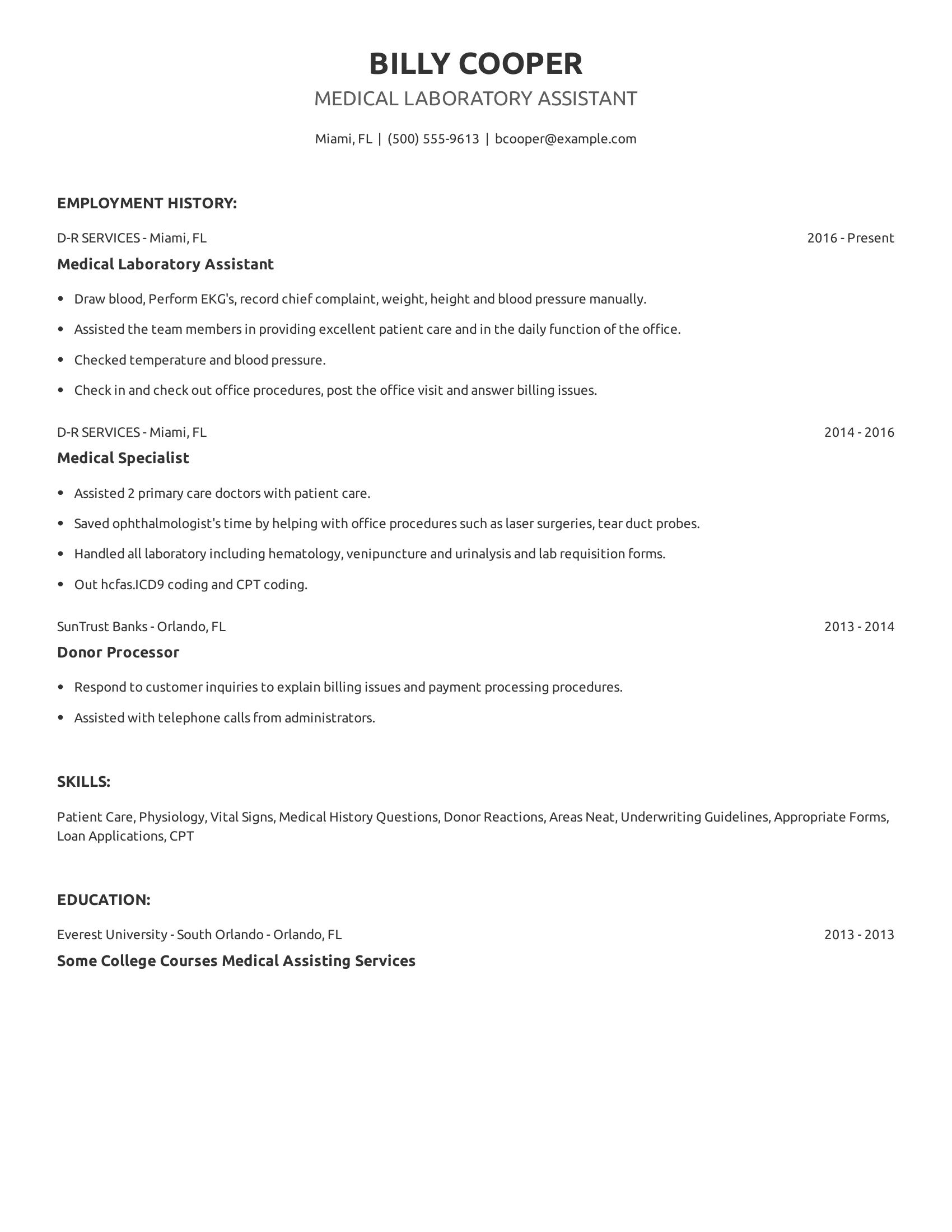
Clinical laboratory scientist internship resumes should include relevant experience, education, and technical skills. A good resume highlights hands-on experience in laboratory settings, familiarity with diagnostic tools and procedures, and the ability to perform quality control and maintenance tasks. It should also demonstrate knowledge of medical terminologies and practices related to clinical laboratory science.
This resume includes these specifics by detailing internships at renowned institutions where the candidate performed various lab tests, maintained equipment, and recorded results. It mentions specific tasks such as administering injections, performing urinalysis, and conducting DNA typing. This demonstrates practical experience in a range of laboratory functions, which is important for the role.
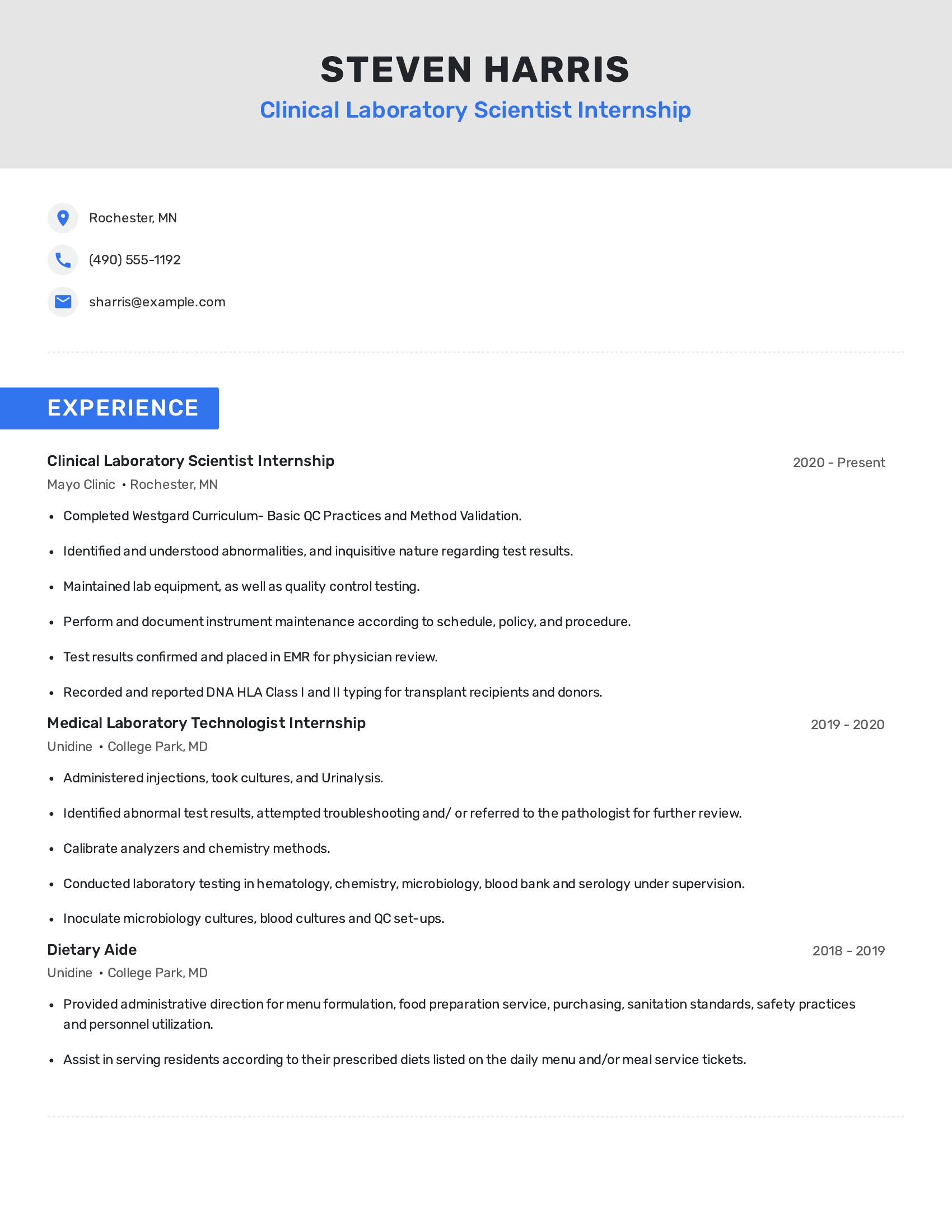
Medical laboratory technician assistant resumes should include clear job titles, employment dates, and locations. They must detail specific duties performed, such as preparing patients, assisting with tests, organizing workspaces, and conducting lab procedures like venipuncture. A good resume also lists relevant skills and educational background. The information should be concise and focus on job-related tasks and achievements without superfluous language.
This resume effectively includes relevant job titles, dates, and locations for each role. It lists specific duties such as preparing patients for tests, performing venipuncture, and assisting with quality control inspections. Key skills like specimen collection, data collection, and patient care are clearly highlighted. The education section is concise and relevant to the field of medical assisting.
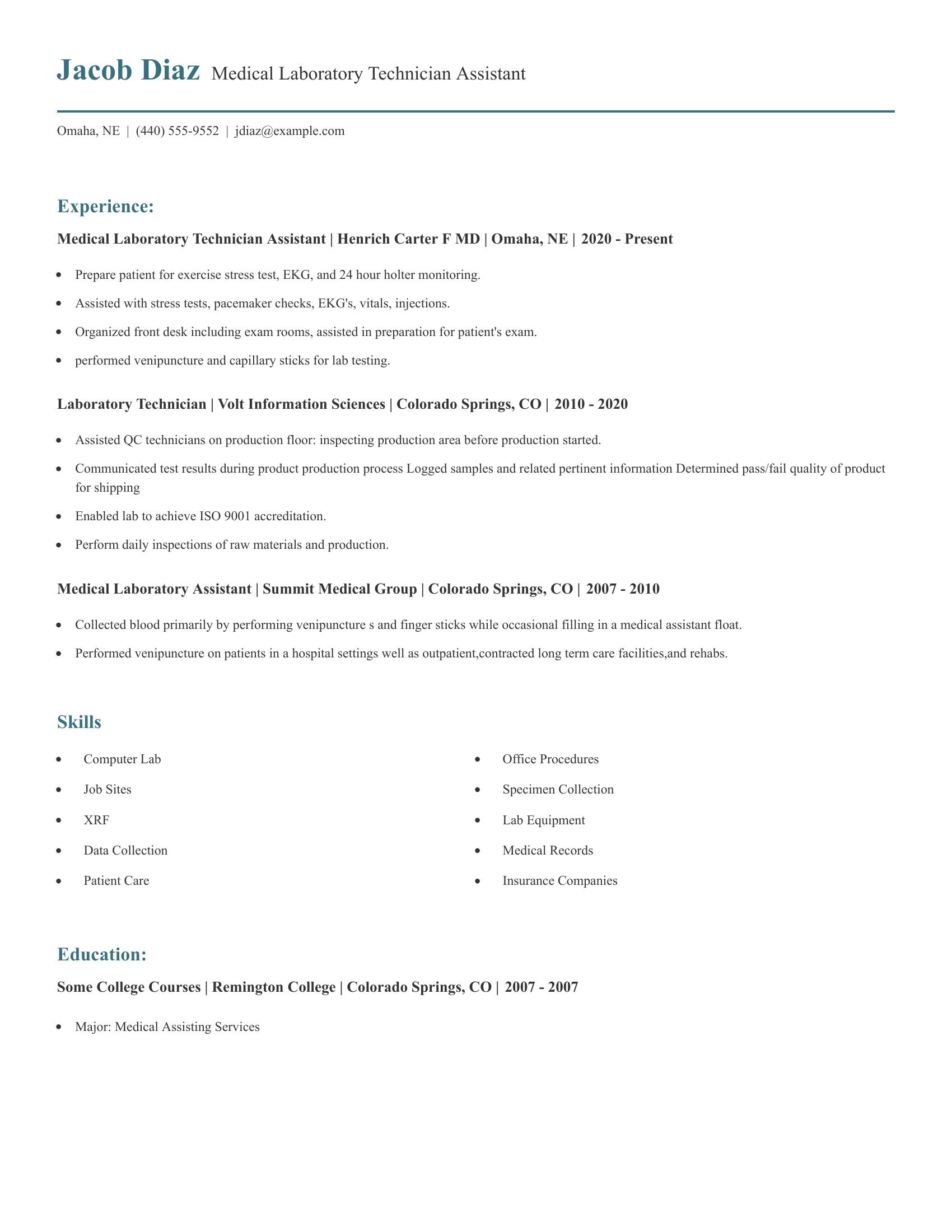
Chief medical technologist resumes should highlight extensive experience in laboratory testing, quality control, and regulatory compliance. They should also showcase strong leadership skills, the ability to interpret and report test results, and familiarity with various testing departments. Education and specialized skills relevant to medical technology are crucial, along with a track record of research and publications.
This resume includes specific details such as performing laboratory tests across multiple departments and leading quality assurance programs. It demonstrates leadership as a lead technologist in microbiology and general lab settings. The candidate's educational background includes advanced degrees in medical technology and physics, and their skills span various technical areas like RNA and cancer research. These components collectively form a comprehensive chief medical technologist resume.
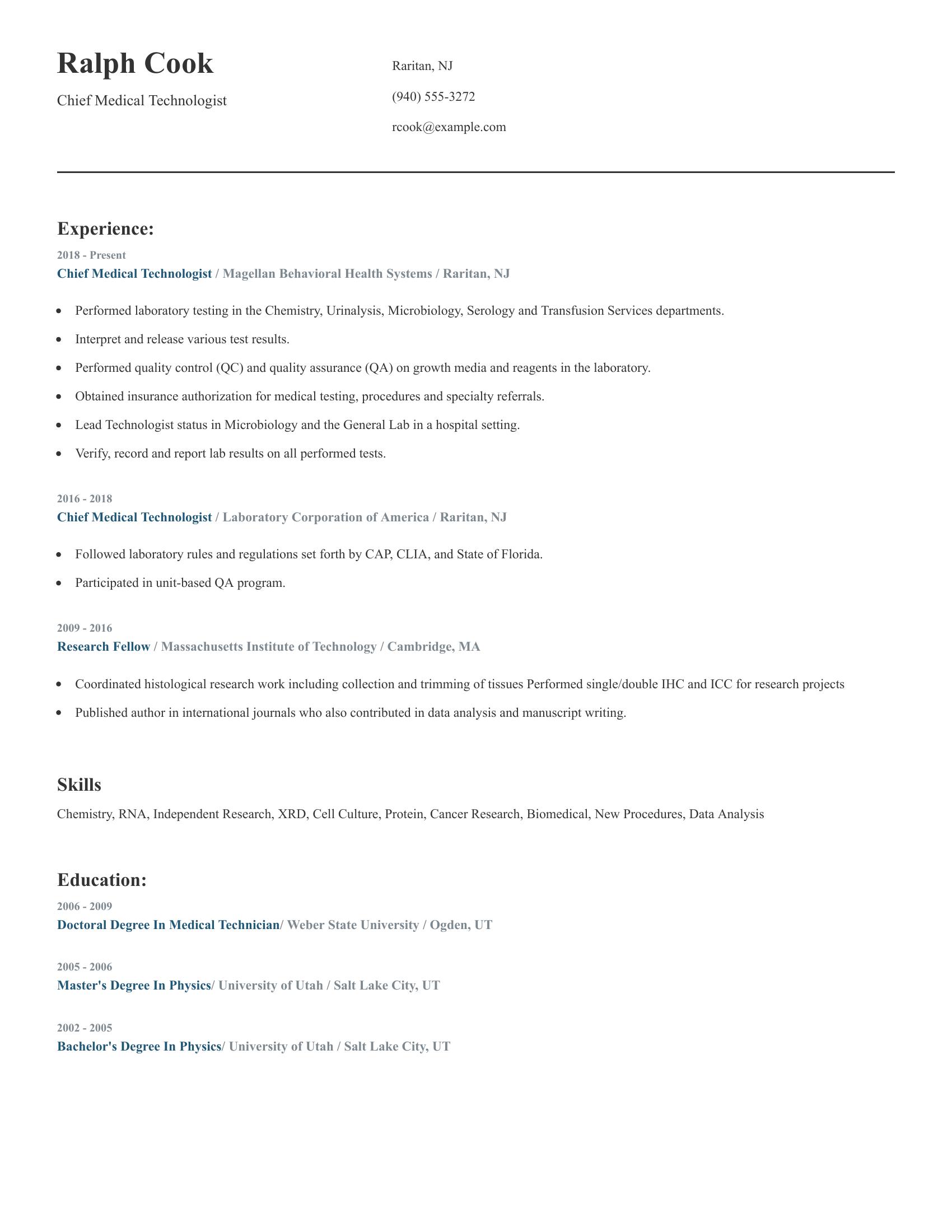
Clinical laboratory assistant resumes should highlight relevant experience, technical skills, and adherence to regulatory standards. Important elements include work history in lab settings, proficiency in procedures like venipuncture and specimen processing, and familiarity with compliance protocols. Clear communication skills and the ability to manage administrative tasks are also valuable.
This resume includes those specifics well. It outlines roles in various lab environments, detailing specific tasks like HLA Class 1 typing by PCR, venipuncture, and EKG testing. It also shows experience with administrative duties and compliance with state and federal regulations such as CAP, CLIA, and COLA. The resume demonstrates a well-rounded background in both clinical and administrative aspects of lab work.
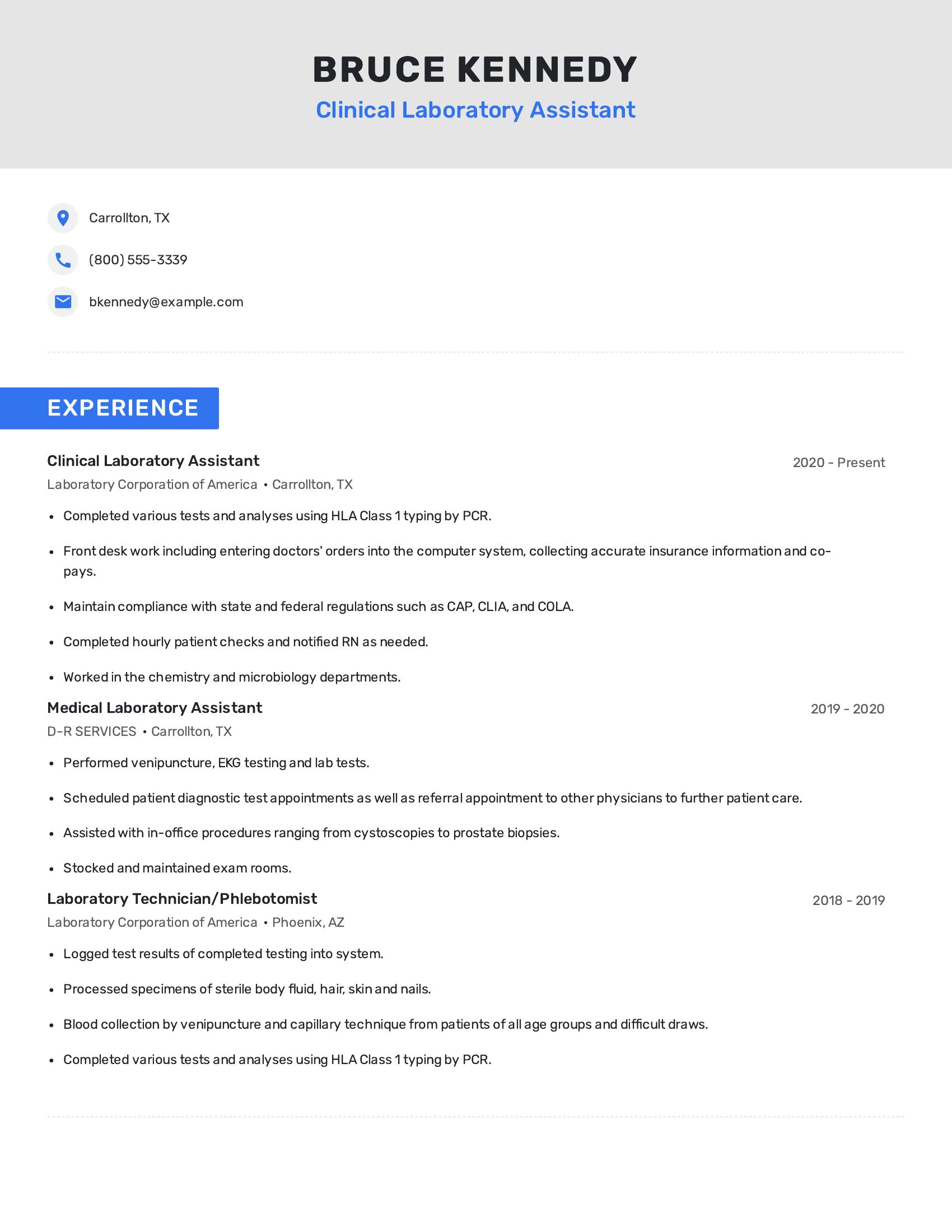
Molecular technologist resumes should detail a candidate's experience with various laboratory techniques, regulatory compliance, and quality control processes. It is important to highlight hands-on experience with specific molecular biology methods like PCR, AS-PCR, and PCR-RFLP. The resume should also include compliance with regulations from organizations such as CLIA and FDA, and any participation in audits or inspections. Additionally, educational background and relevant certifications or degrees should be clearly stated.
This resume includes many specifics that make it strong for a molecular technologist position. It lists extensive experience with PCR techniques and quality documentation, highlighting work from 2014 to present. It mentions compliance with major regulatory bodies like OSHA and HIPAA, adding credibility. Previous roles demonstrate a solid background in medical technology, including routine testing and regulatory inspections. The educational section shows a relevant degree, supporting the candidate's qualifications. Key skills are listed concisely, covering essential areas like specimen collection and microbiology.
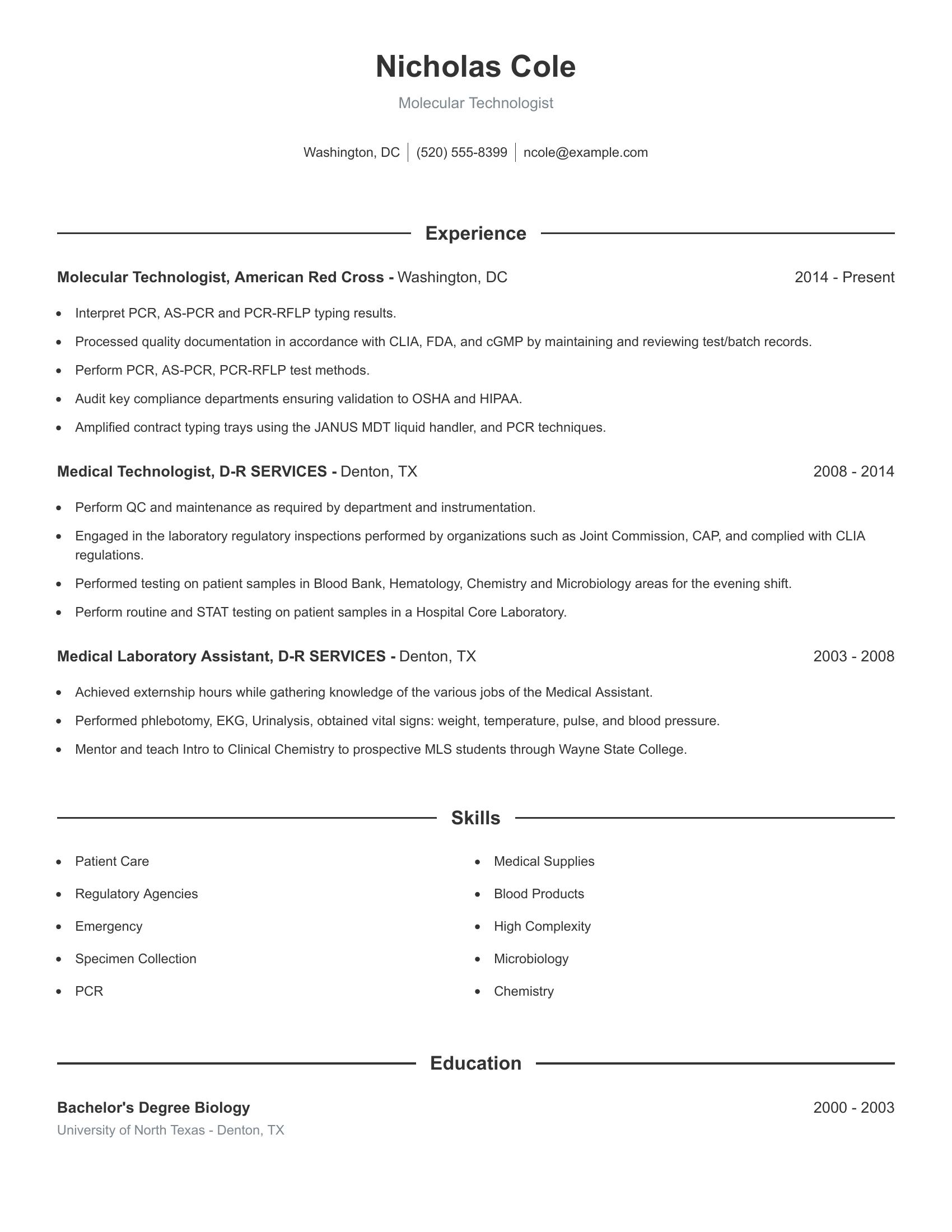
Senior medical laboratory technician resumes should highlight hands-on experience, technical skills, and a thorough understanding of lab protocols. They should list job titles, employers, and dates of employment. Duties and accomplishments should be clear and specific. Certifications and familiarity with lab equipment and procedures are important. The resume should reflect both technical expertise and the ability to maintain accurate records.
This resume includes relevant job titles and experience spanning different roles in various labs. It lists specific duties like testing samples, maintaining equipment, ordering supplies, and implementing new policies. The resume also mentions technical skills such as PCR techniques and genetic sequencing. Demonstrated experience with quality control records and adherence to regulations is evident. Each job role outlines clear responsibilities and contributions.
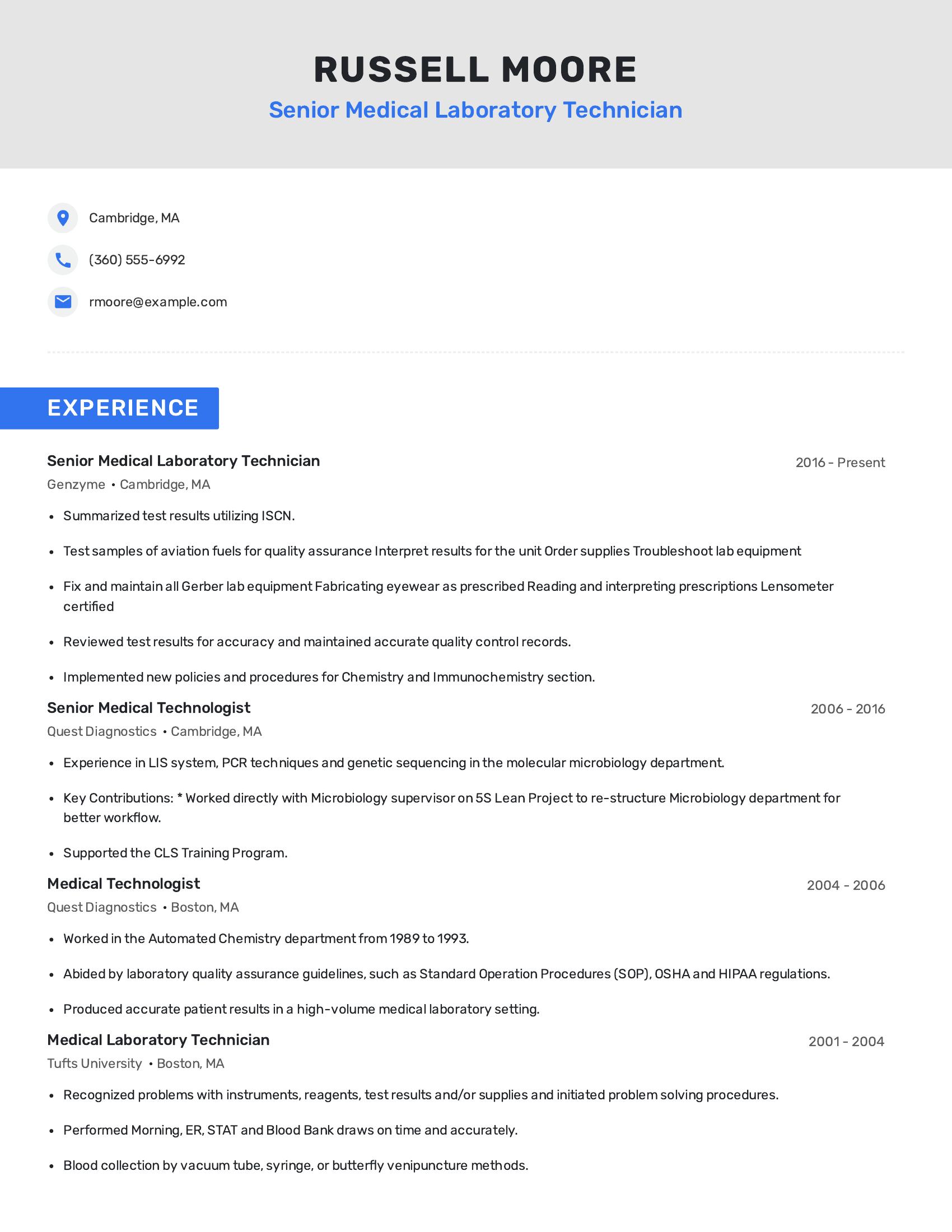
Detail your experience with lab equipment and technology. List specific tools like hematology analyzers, centrifuges, or spectrophotometers. Mention any software you use for lab management.
Highlight your knowledge of safety protocols and regulations. Include examples like handling hazardous materials or understanding OSHA guidelines. This shows you prioritize a safe work environment.
Showcase relevant certifications and education. Mention your degree in medical technology and any certifications, like ASCP. This proves you meet the professional standards for a medical technologist.
A medical technologist's resume should include contact information, a professional summary, skills, work experience, education, and certifications. Clearly list technical skills like operating lab equipment and performing tests. Highlight job duties like analyzing specimens and maintaining lab safety. Include degrees in medical technology or related fields. Mention certifications like ASCP.
A medical technologist summary should highlight relevant skills and experience. Include certifications and focus on major duties.
Follow these tips for an effective summary that grabs attention quickly.
Focus on duties and achievements directly related to lab work and patient care.
Use clear language and specific examples that show your impact on lab operations.
Medical technologists need specific technical skills to do their jobs well.
Medical technologists also need interpersonal skills to work effectively.